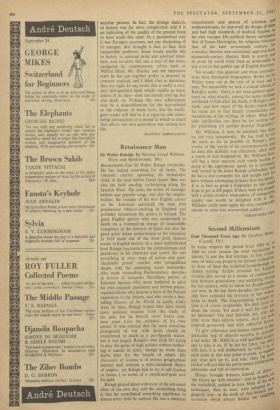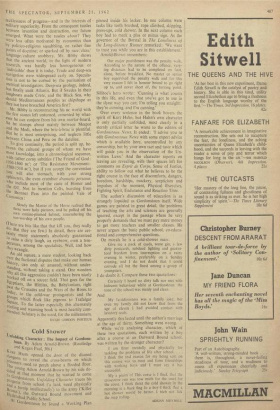Second Millennium
IN many respects the period from 2000 ac to 1000 nc must remain the most enchanting .1" history. It saw the first stirrings, in four con tirl' ents, of what can properly be termed civilisatio.n. In three of them the technical breakthrough .111 eluded writing. Scripts invented for keeping records also served as a means of corninnni.c4- tion between generations—not excepting, the last century, with its talent for deciphermerre' our own. In the last three decades, too, seierl,Lini. digs have extended the territory of that inn;;', n.ium. in depth. The fragmentation wrought time is of course irreparable. We shall never re- time deem the whole. Yet need it wait for ever an historian? The best histories are, after2-di inspired more than interim reports, eked our 'a inspired guesswork and with colourful filctl°,_;; To. give coherence and human interest to tr,' particular bag of disjecta ntembra is certain'', a tall order. Mr. Bibby is as well qualified as anY,, during one to. take it on. If he lets his fancy run 04;i with him, it is well deliberated; he reins it in' in e. ach point in this solo point-to-point, to exr,st just what he's up to, and why. Only the n?nu,... criticaladmra will notffiunl id his performancecon exhilarati 6 Horses brought trousers instead of skirts,,n the future lay with trousers'—just as brone. evi the battlefield, yielded to iron. Most of the.° a techniques, then as now, were adopted111„Li0. gingerly way—in the teeth of that hieratic ng servatism which always brakes the heath° recklessness of progress—and in the interests of military superiority. From the consequent tussles between invention and destruction, our future emerged. What were the tussles about? They were less often motivated by economics than by politico-religious squabbling, on rather fine points of doctrine; or sparked off by race/class/ language/culture snobbery. Mr. Bibby shows that the ancient world, in the light of modern research, was hardly less homogeneous or indivisible' than it is today. Trade and deep-sea navigation were widespread early on. Specula- lion is not to be curbed by the puritanism of metrical investigators. Deep-sea geology, indeed, has finally sunk Atlantis. But if Swedes in their longboats made Crete, and the Black Sea, why should Mediterranean peoples as shipshape as they not have broached America first?
Mr. Bibby is reconstructing his ac world with
the few stones left unturned, cemented by what- ever he can conjure from his own mortar-board.
, he stomps about mainly between Mespot and the Medi, where the bric-a-brac is plentiful. But he is most enterprising, and neglects little between China and Peru on the dateline.
give continuity, the period is split up, be- twTeeo n the cultural groups of whom we have most knowledge, into a chronological sequence, with rather corny subtitles (`The Friend of God: 1930-1860 ac"; or 'The Resistance Movement: 1580'1510 ac'), but if you accept the convention You will also stomach, with your strong sPhincters, the even crumbier dramatis personae, who include most of the caste of Homer and theOT. Not to mention Celts, bursting from Brenner Pass into the painted Vale of Carnonica: Slowly the Master of the Horse realised that the were holy pictures, and he pulled off his own ermine-plumed helmet, remembering the sun-worship of his own people.
((There are bits like that that kill you, they really do. But they are few.) In detail, there are cer- tainly many statements absolutely guaranteed to raise a dirty laugh, an eyebrow, even a tem- perature, among the specialists. Well, and how they Wrangle.
An old square, a mere student, looking back
°yer the factional disputes that make our human history, can only sit amazed, without under- standing, without taking a stand. One wonders „"y all this aggression couldn't have been nicely off on a soccer field. That goes for the 'c'gYPtlans, the Hittites, the Babylonians, right today the Crusades and the Wars of the Roses to 0, u4Y. to the cold-war protagonists and the raps which flock like pigeons td Trafalgar c,,"cilla.re. To the latter especially this alternately _°11ng and warming book is most heartily com- mended. Salutary is the word, for the millennium.
HUGH GORDON PORTEUS











































 Previous page
Previous page